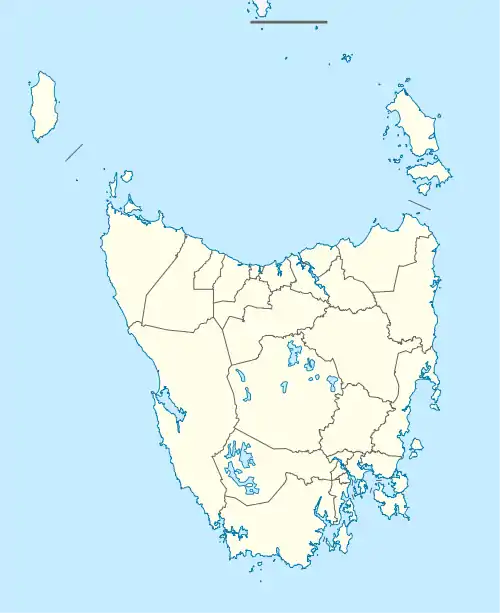Lottah
Lottah is a small town in Northeastern Tasmania. It lies north of the Tasman Highway; the closest settlement is Pyengana and the closest major town is St Helens. Lottah falls within the Break O'Day Council administrative region.
| Lottah Tasmania | |
|---|---|
 Lottah | |
| Coordinates | 41°13′15″S 148°01′19″E |
| Population | 13 (2016 census)[1] |
| Postcode(s) | 7216 |
| LGA(s) | Break O'Day Council |
| State electorate(s) | Lyons |
| Federal Division(s) | Lyons |
Tin was discovered in Lottah in about 1875.[2] The Anchor Mine became operational in 1880, and the town of Lottah grew up around the mine. At its peak, it had several hundred residents, and community facilities included a school, two hotels, two churches, a bakery, and a football club.[3] Lottah supported a small Chinese community, and one of its more notable residents was Senator Thomas Bakhap, who had a Chinese stepfather and worked as an interpreter.[4] People born in Lottah during its heyday include architecture professor Brian Lewis and RAAF officer Alan Charlesworth.[5] The Anchor Mine closed in 1950, at which point the town's population had been in decline for several decades.[3]
References
- Australian Bureau of Statistics (27 June 2017). "Lottah (state suburb)". 2016 Census QuickStats. Retrieved 24 September 2020.

- Goulds Country, TAS, Aussie Towns.
- Lottah: Once-thriving mining town a virtual ghost town in Tasmania's north east, ABC Radio Hobart, 16 March 2016. Retrieved 19 October 2017.
- BAKHAP, THOMAS JEROME KINGSTON (1866–1923), The Biographical Dictionary of the Australian Senate
- Charlesworth, Alan Moorehouse (1903–1978) at Australian Dictionary of Biography. Retrieved on 19 October 2017.
Further reading
- Richardson, Garry (2016), Lottah and the Anchor: the History of a Tin Mine and a Dependent Town, Forty South Publishing